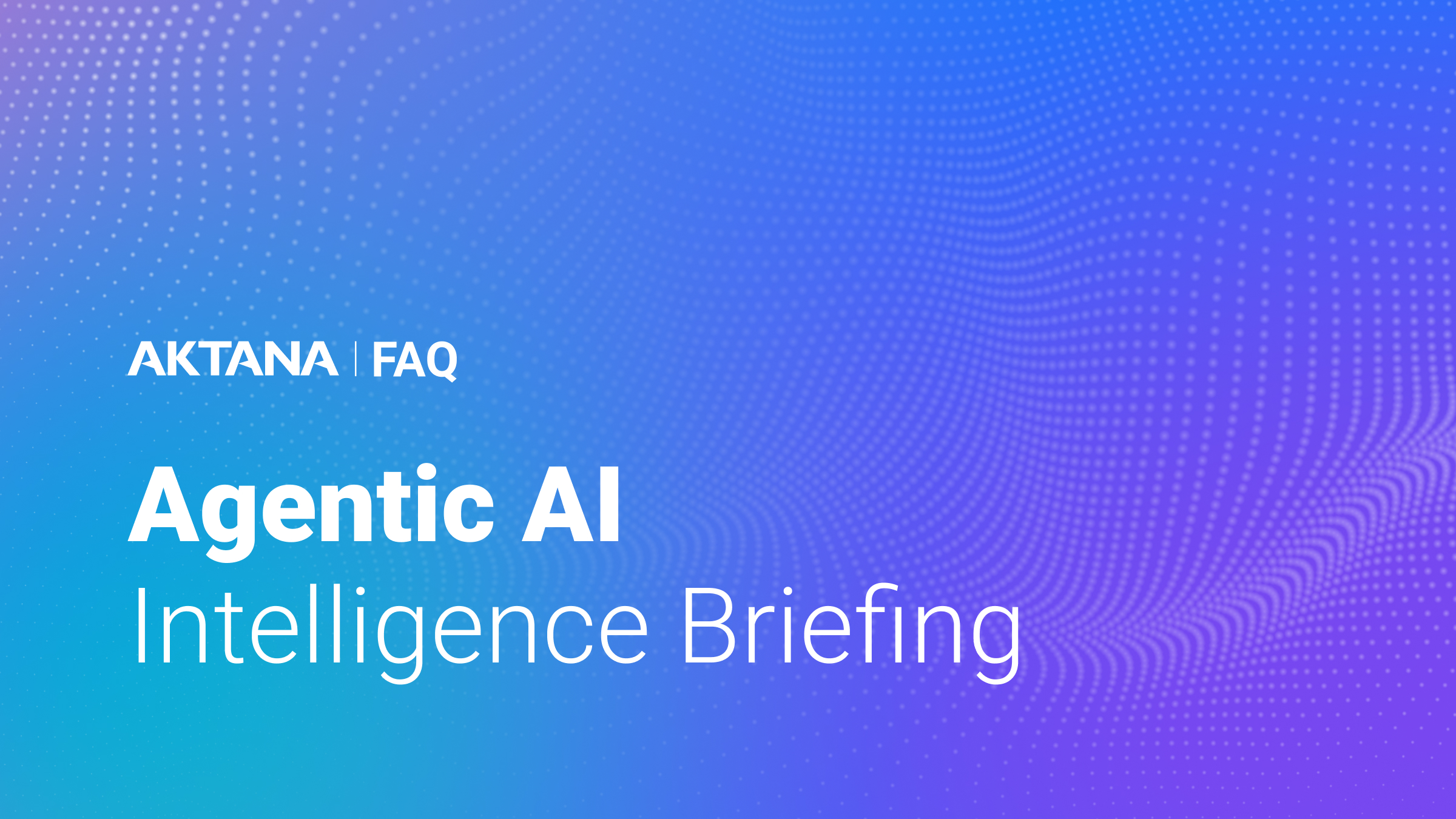An Open Letter from John Vitalie, CEO of Aktana
We’re at a pivotal moment in our industry. Rising cost pressures and global volatility are creating a deeper urgency to maximize investment returns. As intelligent automation programs mature beyond the early stage, expectations are also rising to rebalance content budgets. To ensure every action delivers economic value, organizations must navigate regulatory demands while also optimizing resources in real time. Achieving a lasting competitive advantage should be the definitive strategic goal when implementing practical agentic AI solutions.
AI has been reshaping our industry for years, transforming how we engage with healthcare professionals, optimize workflows, and make data-driven decisions. The rapid progress is exciting, but it also raises important questions:
- Can (and should) AI move beyond recommendations to truly drive action autonomously?
- How do we keep AI operations transparent, compliant, and aligned with strategic goals?
We believe that embracing AI doesn’t mean sidelining the very human expertise, collective experience, and individual judgment that drive results across our industry. Our vision is clear: AI should empower your teams, augment their capabilities, align objectives to execution, and elevate human decision-making rather than replace it.
In Aktana’s Agentic AI Intelligence Briefing you’ll find a practical perspective on how agentic AI can deliver measurable value today, while laying the foundation for a more autonomous, insight-driven future. With contributions shaped by years of real-world experience, we hope this resource provides clarity, context, and inspiration as you chart your agentic AI journey.
Best,
John Vitalie
CEO, Aktana
Insights from Derek Choy, Co-founder and Chief Product Officer
Humans Must Be In-the-Loop Not On-the-Loop
Reflecting on my decade of pioneering AI in life sciences, I’m reminded of the many challenges we faced along the way. When we first introduced AI-driven recommendations, we realized its success depended on more than just intelligence. Initial resistance from field teams, stemming from concerns over loss of control and skepticism toward unclear recommendations, highlighted a critical truth: AI solutions must empower, not replace, human judgment.
Today, I’m proud to see this philosophy drive Aktana’s agentic AI solution. Recent months (and weeks) have brought tremendous advances in AI, and major industry announcements such as Veeva AI, Salesforce Agentforce’s support for MCP, and the Life Sciences Cloud digital labor and data acceleration partnerships. With growing willingness to embrace intelligent automation, the moment is finally right for the industry to realize the vision we set out a decade ago—and unlock its full value.
This vision is that agentic AI has the potential to transform life sciences by streamlining operations and orchestrating omnichannel engagement, freeing professionals to focus more on strategy and outcomes. Consider this scenario:
A Brand Manager reviews AI-suggested tactics based on a domain-specific knowledge base, confident that each action is transparent and strategically aligned.
A Commercial Ops lead confirms that AI recommendations respect resource allocation, brand tradeoffs, and compliance rules, with safeguards for accuracy and traceability.
A Sales Rep receives personalized HCP outreach suggestions—including compliant content—which she can quickly adjust to maintain her personal touch.
A Medical Science Liaison prepares for HCP conversations with AI-curated clinical insights, focusing on what matters most.
And of course, the HCP benefits—accessing compliant information via field reps or even virtual agents, and easily scheduling follow-ups.
Notice that in all these scenarios, one principle holds: AI doesn’t replace people—it elevates them. None of this is about AI taking control away from the humans who make this all happen. It’s about amplifying human potential while reinforcing control, trust, and compliance.
Expert guidance is essential to ensure safeguards in agentic AI, especially as generative AI’s potential for errors, or “hallucinations,” requires continuous human feedback. The life sciences industry requires a constant equilibrium between innovation and compliance. These principles have always been at the core of Aktana’s collaborative AI approach.
While the list of tasks AI will handle independently continues to grow, AI should support, not dictate, decisions. When humans are merely “on the loop,” they’re relegated to overseeing decisions without influence. Instead, they must be “in the loop“: central actors with AI augmenting their expertise, not marginalizing it.
At Aktana, we believe this is a defining moment. Agentic AI could cut down commercial planning and execution timelines from up to 18 months to as little as 6 months. Those kinds of gains — whether in faster product launches, smarter resource use, or more personalized HCP engagement—are transformative. But they’re only achievable if AI is trusted and adopted by your teams. This, in turn, requires AI solutions that are intuitive, explainable, and clearly aligned with strategic goals—all hallmarks of a human-centered AI approach.
Explore FAQs on this topic:
What is Agentic AI, and how does it relate to conventional AI approaches used in life sciences today?
What’s the difference between Agentic AI and AI agents?
What are Agents, and how do they contribute to decision-making in complex systems?
I already have a CRM and Marketing Automation system in place. How does an AI-powered agentic system enhance what I’m already using?
Can I personalize HCP engagement at scale without overwhelming my team with more data and complexity?
Transparency and Traceability As Foundations of Trust
A pivotal lesson from our early AI implementations is that transparency is non-negotiable. In one of our earliest deployments with a major pharma company, we observed firsthand how skepticism arose when AI recommendations felt like unexplained commands rather than thoughtful suggestions. Field representatives questioned the value of AI-driven recommendations because they lacked clear, relatable reasoning. This was understandable—after all, these representatives had significant experience and relied on their judgment and deep customer relationships. For them, trust in AI-driven recommendations was driven not just by accuracy but also intuitive, relatable context that “felt right” in the light of their own professional insights.
The turning point came when we started providing transparent, contextual reasons based on relevant, real-world data for every AI recommendation. This included context like recent HCP interactions, historical prescribing patterns, peer comparison insights, and even subtle indicators like the HCP’s preferred communication channel and timing. This made AI recommendations feel actionable and logical to reps, increasing adoption and confidence in the system.
Transparency in agentic AI is also crucial for strategic brand management. When brand leaders can clearly trace the reasoning behind AI-driven strategies, they can more confidently delegate strategic decisions to semi-automated or even fully automated systems. This enables brand managers to quickly validate, adjust, or embrace recommended strategies without extensive manual review.
Today, Aktana’s agentic AI approach institutionalizes this principle of transparency. Every recommendation our system provides is fully traceable and understandable, ensuring compliance with strict regulatory standards and meaningful human oversight. Our central orchestration engine serves as a transparency hub, providing clear visibility into every decision: why it was recommended, what data informed it, and how it aligns with strategic goals. This explainability is vital for compliance teams, ensuring complete auditability to satisfy stringent regulatory requirements.
Ultimately, transparency and traceability are essential for both building trust and maintaining sustained confidence and adoption. By embedding these qualities into our agentic AI platform, we empower decision-makers with clarity, control, and trust, paving the way for the scalable, reliable omnichannel orchestration essential to the success of today’s pharma organizations.
Explore FAQs on this topic:
Why is advanced orchestration still essential in the age of Agentic AI?
What are the potential benefits of well-designed autonomous agents in life sciences?
What are the risks of “black box” AI in life sciences, and how does Agentic AI mitigate them?
Why is explainability critical for AI adoption in commercial life sciences teams?
Regulatory compliance is a huge concern in life sciences. How can AI-driven agents ensure compliance while still enabling innovation?
Context-Aware AI for Effective Decision Making
When our team at Aktana expanded our AI systems from pilots to global deployments, we found that scaling these initiatives was more complex than anticipated. Initial attempts relied heavily on manual configurations—rules and static models—which rapidly became cumbersome to maintain at scale. We lacked a centralized orchestration mechanism and a structured knowledge base that could dynamically evaluate constraints, and make value driven decisions. This gap led to inefficiencies and stalled adoption.
These experiences taught us the critical importance of having a centralized, dynamic knowledge base at the heart of our AI architecture. Today, Aktana’s multi-agent system leverages this knowledge base to continuously refine its recommendations, rapidly learning what strategies succeed or fail. By capturing real-world signals, such as engagement metrics and KPI attainment, it enables proactive adjustments rather than reactive corrections.
The Aktana Strategy Console drives these feedback loops by mapping strategic objectives to tangible KPIs, providing visibility into what’s working and why. For example, stakeholders no longer need to piece together insights from disparate monthly reports; they gain instant strategic clarity to questions like:
- “What is the current progress on our priority KPIs?”
- “Are our current omnichannel strategies effectively driving these KPIs, and why or why not?”
- “What adjustments can we make immediately to optimize performance?”
This enables teams to act swiftly, share best practices, and adapt strategies in real-time for continuous improvement.
Combining traditional machine learning and rules-based systems with newer, more dynamic AI techniques such as reinforcement learning, generative models and agentic AI has become crucial. This balanced approach ensures recommendations are not only insightful and contextually relevant but also scalable and easy to manage.
Context-aware, continuously learning AI is essential for sustained global impact. At Aktana, we’ve embedded these lessons into our core design, empowering life sciences teams not only to execute today’s strategies more effectively but to dynamically evolve them as conditions change.
Explore FAQs on this topic:
Does Agentic AI use LLMs and NLP? What role do these technologies play?
Can Agentic AI solve optimization problems, such as resource allocation in pharma sales and marketing?
What are some real-world applications of Agentic AI in life sciences, particularly in pharma and biotech?
What makes a multi-agent system better suited for life sciences than a single-agent AI model?
How does context-aware orchestration improve HCP engagement?
Download PDFPracticality and Integration as Cornerstones of Future-Ready AI
The pharmaceutical industry’s omnichannel landscape is inherently complex, characterized by transitioning CRM systems, siloed field and digital operations, intricate product portfolios, and stringent regulatory constraints. Recognizing these challenges, our approach emphasizes practicality, ensuring that AI adoption integrates seamlessly with existing workflows, systems, and regulatory frameworks.
Transitioning between CRM systems can be a daunting task for pharmaceutical companies, often leading to disruptions in operations and an inability to innovate during lengthy migration periods. Aktana’s Omnichannel Data Interface (ODI) is designed to support clients through these transitions, facilitating seamless data migration and system interoperability. By harmonizing data across disparate sources, ODI ensures that critical data and intelligence investments remain accessible and actionable during transition, enabling innovation today.
In an industry where organizational change is frequent, maintaining continuity in omnichannel strategies is crucial. Our solutions are designed to adapt to such shifts, ensuring that transitions—whether due to personnel changes, mergers, or restructuring—do not disrupt ongoing operations. By providing a unified, intelligent orchestration platform, we help organizations maintain strategic focus and operational efficiency, even in moments of flux.
The journey toward autonomous AI is not uniform across organizations; it varies based on readiness, infrastructure, and strategic goals. Aktana’s agentic AI approach is tailored to meet customers wherever they are on this journey, supporting a full spectrum—from manual campaigns and rule-based execution to highly sophisticated, AI-driven engagement. This phased approach allows teams to gradually build trust in AI technologies while ensuring that each step aligns with real-world capabilities and evolving business needs.
By balancing innovation with integration, and ambition with practicality, Aktana’s solutions bridge the gap between today’s operational challenges and tomorrow’s intelligent automation—paving the way for a future where AI is a trusted, transparent, and indispensable partner to life sciences teams.
Aktana’s commitment is to help you navigate and thrive in this evolving landscape practically, transparently, and collaboratively. We believe Agentic AI is more than technology—it’s a partner in your strategic vision, helping you achieve ambitious outcomes reliably and compliantly.
We invite you to join us in this conversation, explore further with our comprehensive intelligence briefing, and collaborate with us to shape a future where AI empowers, rather than replaces, human judgment and leadership.
With sincere appreciation and anticipation,
John Vitalie
CEO, Aktana
Derek Choy
Co-founder & Chief Product Officer, Aktana
Explore the full briefing:
Answers to the most urgent questions in 2025 and beyond.
20+ Life Sciences FAQs on Agentic AI answered
Lessons from Aktana’s real-world deployments
Designed for commercial, marketing and medical leaders
Built for teams navigating CRM shifts and AI orchestration
Download Full eBook


